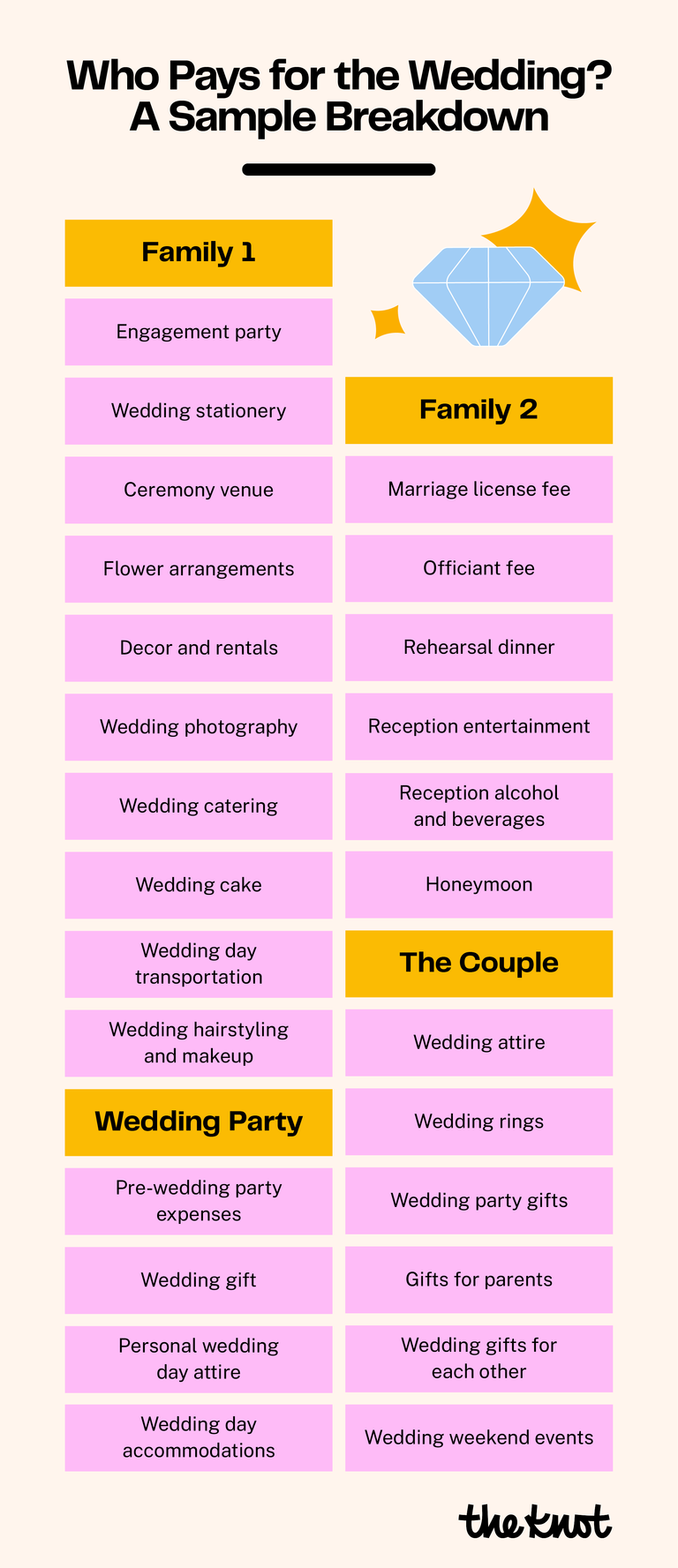Weddings can be expensive affairs. With the average cost of a wedding in the US coming in at around $30,000 in 2022, it’s no wonder that couples getting married and their families stress about how to cover the costs.
In the past, there were clearer guidelines around which family members were expected to pay for different wedding expenses. Over time, these traditions have shifted as social norms, relationships, and budgets have changed.
Understanding the traditional breakdown can help couples having conversations with their families around financial contributions. However, the most important thing is to do what works best for your unique situation.
The Traditional Wedding Budget Split
Traditionally, here’s the rough breakdown of who pays for what when it comes to wedding expenses:
- The bride’s family covers the majority of wedding costs, including:
- Venue
- Catering
- Wedding cake
- Wedding decor
- Wedding flowers
- Wedding stationery
- Wedding favors
- Wedding photography
- The groom’s family covers:
- The marriage license
- An officiant’s fee
- The bride’s engagement ring and wedding bands
- The honeymoon
- The rehearsal dinner
- The bride pays for:
- Her wedding dress
- Wedding accessories
- Hair and makeup
- Bridesmaids gifts
- The groom pays for:
- His tuxedo rental
- Gifts for his groomsmen
The Reason Behind the Traditional Split
These traditions date back to times when the bride’s family were expected to provide a dowry upon her marriage. The dowry could include money, property, or other assets that would help the new couple establish their life together.
The dowry was intended to compensate the groom for taking over the financial responsibility of caring for his new wife. Even as dowries have faded from practice in most modern Western cultures, some version of the bride’s family bearing the wedding costs has stuck around.
Changes to Tradition
However, traditions and social norms have greatly evolved around weddings. Here are some of the biggest shifts:
- Couples getting married later in life, often after establishing independent lives and careers
- More couples paying for all or part of their own weddings
- Smaller, more casual weddings becoming popular
- Family dynamics changing – divorced parents, blended families, etc.
These influences have led to more variations in who pays for the wedding. The old traditions serve more as loose guidelines now than hard rules.
Navigating the Money Conversation
For couples planning a wedding, it’s important to have open and non-judgmental conversations with parents and family members early on about financial expectations.
Be understanding that not everyone’s financial situations are the same. The economy, job changes, family obligations, health issues, and other factors can all impact budgets.
If parents want to contribute but can’t afford the full traditional costs, consider having them cover specific expenses within their means rather than a lump sum. This gives them the chance to feel involved while working within realistic limits.
Tips for Managing Finances
- Prioritize must-haves over nice-to-haves
- Set a total budget cap based on what you can afford to pay, then work backwards
- Research ways to save, like off-peak season, non-traditional venues, buffet over plated meals, etc.
- Focus spending on experiences over things, like photography over fancy favors
- Consider nontraditional sources like crowdfunding from wedding guests
The Bottom Line
While traditions provide a helpful starting point, each couple’s financial situation is different. The most important thing is to agree on shared priorities and a budget, then have open conversations with family around what they are able and willing to contribute.
The wedding itself is just one day, but marriage is meant to last forever. Making smart financial decisions from the start helps the partnership thrive in the long run.




